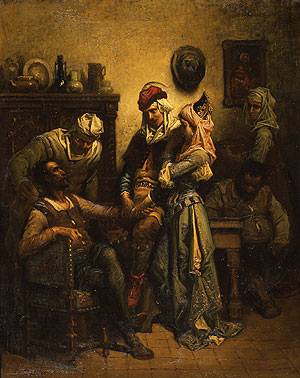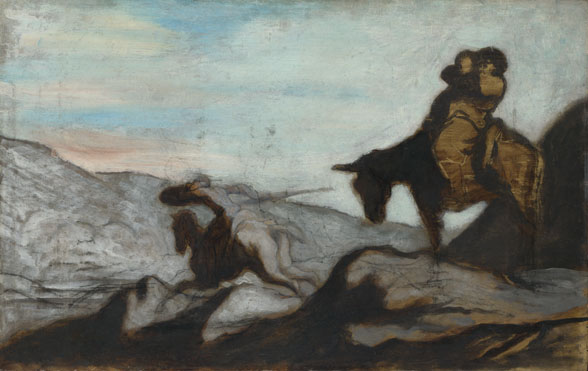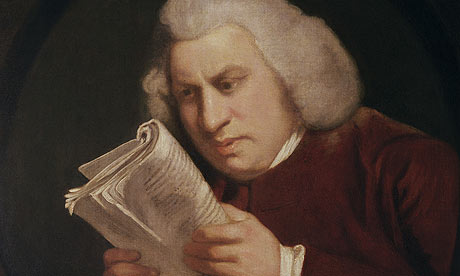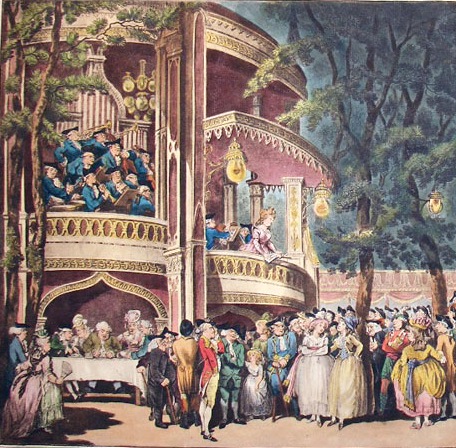Common sense is usually said to be sturdy, but in fact it has been faring badly ever since the scientific revolution began. It is plain, common sense declared in those days, that the sun revolves around the earth. Wrong said Copernicus, and of course the astronomer was correct. It is plain, said common sense, undaunted, that heavy bodies fall faster than light ones. Wrong said Galileo, and of course Galileo was right.

Gustave Dore. Sancho Panza and Don Quixote. Read More:http://www.oceansbridge.com/oil-paintings/product/41389/donquixoteandsanchopanzaentertainedbybasilandquiteria
So, common sense, more often than not has been on the defensive. In retreat. When economics was founded, common sense, it turned out, did not understand money. By the time Ibsen was ready to proclaim that “a majority is always wrong” , the authority of common sense had seemingly reached some sort of nadir. The flip side of all this is the almost inexhaustible supply of mountebanks, conspiracy theorists, hucksters of all stripes, can gather sizable constituencies, and occasionally an entire nation, to move off a cliff in unison. Common sense is far easier to recognize than define, being an unthinking reasonableness of humanity according to Hegel.
Ultimately, common sense is not the sense of commoners. It is the sense that is found to be common when the facts of say alegal case, a trial by jury, are inspected from any number of personal viewpoints. The origin of common sense is simply humankind’s faculty for talking and exchanging views. It is the deliberations of a vast, diverse jury charged with rendering a sober verdict on human life, human nature, and human passions.

---Honore Daumier. Read More:http://www.nationalgallery.org.uk/paintings/honore-victorin-daumier-don-quixote-and-sancho-panza
To say that common sense has lost its grip is to say that prideful people and one-sided views hold undue sway in our councils. Someone once mentioned to Dr. Samuel Johnson that a certain individual claimed no distinction between right and wrong. Johnson replied, ” If he does really think there is no distinction between virtue and vice, why, Sir, when he eaves our houses, let us count our spoons.” Johnson wielded common sense like a club, but, prideful conceit makes its appearance and common sense subjects it to the comprehensive fact: if we didn’t distinguish between virtue and vice, no one could trust another and the whole system of life would fall apart.

Samuel Johnson detail. by Joshua Reynolds. ---Johnson is the last important critic of the neoclassicism, in an age where pre-Romantic ideas are more widely accepted than neoclassicism. Johnson is usually less dogmatic and more eclectic than Pope in his assertion of the neoclassical values. Moreover, sometimes Johnson's claims are contradictory: for instance, he wants at once realism and poetic justice on stage. He is not a consistent theorist, but rather a practical critic of penetrating insights, honesty and common sense. In Johnson we can witness both the dead weight of a tradition and the signs that a new conception of literature is emerging. Johnson had a strongly classical mind, and a great desire for order and coherence. But he had very little patience with whatever he perceived to be false, useless or pretentious, and he made short work of many neoclassical prejudices. ---Read More:http://www.unizar.es/departamentos/filologia_inglesa/garciala/hypercritica/04.Neoclassical/Neoclassical.4.4.html
Common sense, then, is anti-historical. It insists that nothing much really changes. Our general nature will still be visible under any cloak that history fashions for it. However, common sense and modern thinking have drifted apart. The modern mind is history minded. It dwells not on permanence, but on change. It sees the individual submerged in history and altered perpetually by history- 9-11, JFK, Vietnam etc.- and from the vantage of modern thinking, the comprehensive facts of our general nature hardly seem important. They appear to be a sort of lumpish residue left behind by the historical process and consisting chiefly of trifling truisms about birds of a feather and the like. A perilously shallow view.
The facts that common sense grasps are often quite profound since the rule always cuts deeper than the exception. We can derive plausible explanations for crime but few experts can explain a deeper mystery, namely why most people are law-abiding. There are lots of explanations for suicide, but not many of non-suicide. Even Aristotle gave up any thought of trying, ” there must be something sweet about life, or men would not cling to it so.”

---Vauxhall, 1732, engraving after a watercolour by Thomas Rowlandson, published by Richard Powell: In the lower box is a supper party of James Boswell, Dr Samuel Johnson, Mrs Thrale and Oliver Goldsmith. Mrs Weichsel sings from the front balcony while Mr Barthelemon leads the orchestra (Princeton University Libra
--- Read More:http://shapersofthe80s.com/tag/vauxhall-gardens/So, prideful thought and common sense are at opposite spectrums, yet the poles turn out to be the very reverse of what they seem at first glance. It is vaunting prideful thought, the thought of singular people, that usually ends in a cut and dried syllogism, and its plodding, worldly common sense that leads to mysteries beyond rational solution.
No one has rendered this paradox more beautifully than Cervantes. His Don Quixote represents all that is noble and silly in vaunting singular pride and in a life bravely lived according to one’s own stock of notions. Quixote himself adheres to a quite systematic, if comical, ideology: the rules and principles of chivalric romance. At the end of his long adventure in the chivalric system, however, Quixote takes to his bed with a common sense proverb on his lips.
“There are no birds this year in last year’s nests,” he wearily reminds his faithful companion. It is Sancho Panza, who represents all that is earthbound and commonsensical, who begs Quixote with tears in his eyes to get out of bed and go roving once more. So reason, the product of one man’s communion with himself, ends with a bump on the solid earth, while common sense, the product of humankind gossiping around the village pump, points the way to unfathomable depths.
ADDENDUM:
He has become an emblematic character among literary critics, as a personification of English common sense and distrust of vague abstractions or fantastic theoretical systems. One anecdote told by Boswell exemplifies this hard-core common sense, with both its advantages and its limitations. The following anecdote from Boswell exemplifies this hard-headed no-nonsense theory, which has its limitations as well as its virtues:
1. After we came out of the church, we stood talking for some time together of Bishop Berkeley’s ingenious sophistry to prove the non-existence of matter, and that every thing in the universe is merely ideal. I observed, that though we are satisfied his doctrine is not true, it is impossible to refute it. I never shall forget the alacrity with which Johnson answered, striking his foot with mighty force against a large stone, till he rebounded from it, “I refute it thus.”
A large part of Johnson’s criticism consists in rejecting what he sees as logical absurdities both in criticism or in literature. His common sense leads him some times into narrowness, because he tends to interpret poetical or critical conventions too literally; no doubt he also does away with a lot of nonsense and rubbish. Read More:http://www.unizar.es/departamentos/filologia_inglesa/garciala/hypercritica/04.Neoclassical/Neoclassical.4.4.html








 COMMENTS
COMMENTS



